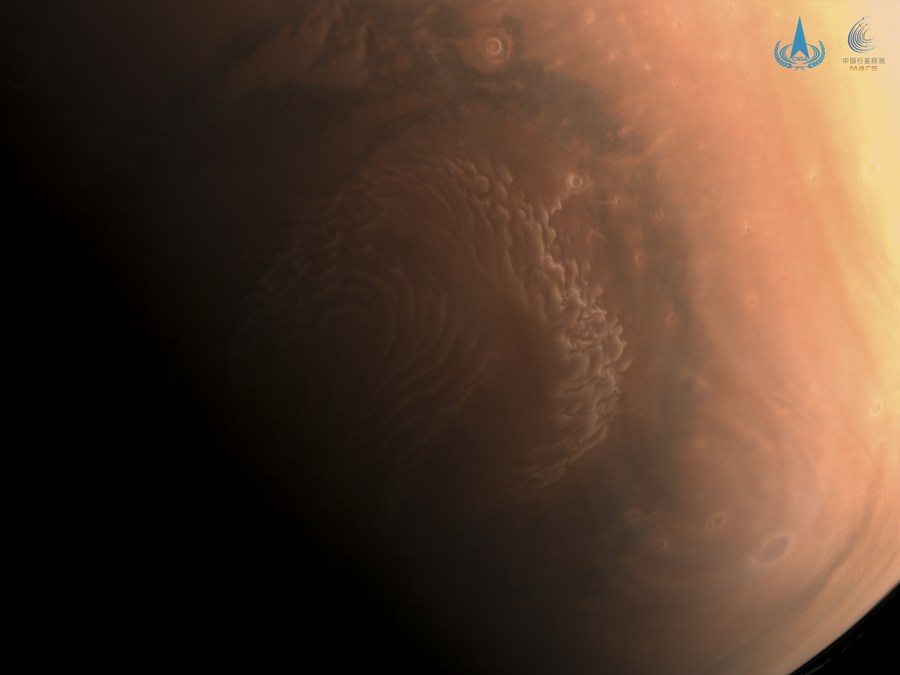China's Mars landing a milestone in its space technology progress
- By Tom Fowdy
 0 Comment(s)
0 Comment(s) Print
Print E-mail China.org.cn, May 19, 2021
E-mail China.org.cn, May 19, 2021

Last week, China became the second country in the world to successfully land and operate a rover on Mars. The Tianwen-1 probe (its name means "questions to heaven") had reached the red planet and gone into orbit several months ago, before launching its Zhurong rover.
This is a journey that spanned over a year and 323 million kilometers. The hazardous obstacles to overcome meant the outcome was never guaranteed, making it all the more significant as an achievement.
Why does Mars matter? And why do discoveries about Mars arouse our interest so deeply?
Mars is a world of wonder and mystery. Despite the seemingly enormous difference between it and Earth, it is, nonetheless, our neighbor, something "close" to us yet also different and alien.
Its iron oxide surface is what gives it its iconic red colour, which has been associated in mythology across the world as a symbol of fire or rage. Its Latin name derives from the Roman God of War, while in Chinese, it is known as Huoxing ("fire star"). In India it is called "Mangal" after the god Mangala, who represents anger.
This longstanding fascination with Mars has led to it being the frequent subject of public imagination and speculation as to whether there is or ever was life there, and just what can be discovered about it.
This has made it a frequent topic of various literary works, both realistic and fantasy. "War of the Worlds" by H.G. Wells in 1897 famously portrays a Martian Invasion of the Earth, and while the idea of "little green men" dwelling on Mars has gradually become scientifically obsolete, newer works of film such as Ridley Scott's "The Martian" starring Matt Damon have explored the idea of human exploration of the red planet.
In this case, Mars has anchored itself as "the gateway to outer space" for humanity, because it is the most viable place within our reach which we do not yet fully understand. Venus and Mercury are too hot for humans to land on; the Gas Giants Saturn and Jupiter are, as described, made out of gas and cannot be landed on, while Pluto is a space journey over a decade away.
That leaves Mars the sole candidate as "the human frontier" and it is being subsequently embraced as such by all capable of reaching it, from NASA to China's Space Agency and, of course, to the dreams and aspirations of Elon Musk and SpaceX who has even spoken of building a colony there. Talk of humans landing on Mars for the first time is speculated within the next decade.
As a result, China's successful Mars landing makes it one of the global leaders in discovering the red planet. The Zhurong rover will make a vast contribution to public knowledge of the world, aiming to study the morphological and geological structure, the characteristics of its surface and underground, learn about the rocks and minerals on the planet and its ancient waterways through the remnants of rivers and lakes, while also learning about its atmosphere and magnetic field, and of course any evidence of past and current life.
Whatever is found will be helpful for the entire world in revealing more about a body so far away that has nonetheless fascinated us.
China's development in space technology has witnessed progress, and Zhurong is just one of many things right now following on from the success of the Chang'e programs on the Moon and the Tiangong space station under construction. For those interested in the cosmos, these are interesting times.
Tom Fowdy is a British political and international relations analyst and a graduate of Durham and Oxford universities. He writes on topics pertaining to China, the DPRK, Britain and the U.S. For more information please visit:
http://www.formacion-profesional-a-distancia.com/opinion/TomFowdy.htm
Opinion articles reflect the views of their authors, not necessarily those of China.org.cn.
If you would like to contribute, please contact us at opinion@china.org.cn.





